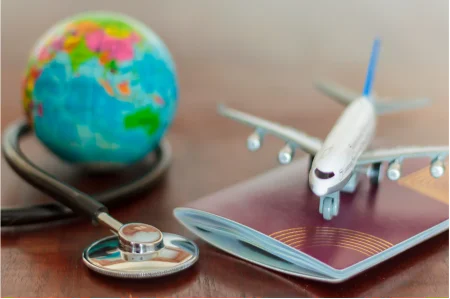Travel Medicine

A Travel Medicine Clinic is dedicated to ensuring the health and safety of international travelers. This specialized field focuses on preventing, diagnosing, and treating travel-related illnesses while offering tailored advice for specific destinations. Services provided by a Travel Medicine Clinic in Mumbai or a Travel Medicine Clinic in Mira Bhayandar include pre-travel consultations, recommended vaccinations, preventive medications, and health assessments. These clinics are invaluable for travelers visiting regions with health risks, offering personalized guidance to reduce exposure to diseases. Post-travel care is also available for those who experience health issues during or after their trip. With global travel on the rise, these clinics play a vital role in promoting safe and healthy journeys for all.
What Is Travel Medicine?
Medical tourism is a specialization of medicine that concentrates on the safety and health of those who travel across the globe. It covers a broad range of medical practices, which includes diagnosing, prevention and treatment of ailments and health risks that are associated with traveling. The aim of travel medicine is to help make travelers more prepared for their travels and ensure that they are well-informed about the potential health risks and vaccinations, as well as medications and preventive measures that are specific to their destination.
How Does Travel Medicine Occur?
- Consultations prior to travel The majority of travelers visit clinics for travel medical for specialized medical advice based on their itinerary. This includes recommendations for vaccines and preventive medication.
- Vaccinations Most destinations require or suggest particular vaccinations, for example those against Hepatitis A, yellow fever, typhoid and the rabies. Medical professionals who treat travelers administer these vaccinations based on the individual’s health requirements along with travel planning.
- Health assessment Health assessments for travelers include analyzing medical history, identifying any potential health risks, and offering guidelines on how to deal with any existing health issues while traveling.
- Post-travel assessments When you return to their home country, travelers can seek medical treatment for any health problems which they have experienced during their travels such as signs of a disease or other health issues related to travel.

It is when people seek medical advice or treatment prior to or during their journeys. It could involve:
How Common Is Travel Medicine?
- Fever is a common symptom of infection, it could indicate a range of ailments that can be contracted while traveling.
- Gastrointestinal problems The symptoms such as nausea, diarrhea, or vomiting may be caused by eating unclean water or food.
- Skin infections or rashes Travelers can suffer from skin infections or rashes because of insects or the exposure of insecure surroundings.
- Reflux symptoms Sore throat, or trouble breathing could indicate respiratory illnesses which can be contracted when traveling.
- Malaise or fatigue generalized feeling of fatigue or ill-health can be because of a myriad of causes such as stress, jetlag or other underlying illnesses.
- Treatment for symptoms A variety of medications available over the counter help with symptoms like nausea, fever and diarrhea. The use of prescription medications is sometimes necessary in the case of more serious symptoms.
- Hydration Hydration: Keeping hydrated is crucial, particularly when you suffer from gastrointestinal issues to avoid dehydration.
- Antibiotics When there are infection with bacteria, such as respiratory or traveler’s diarrhea Antibiotics can be prescribed.
- Follow-up treatment travelers who experience ongoing or serious symptoms following their return home should seek medical assistance to receive further evaluation and treatment.
The practice of travel medicine is becoming more popular, especially as travel to other countries has grown over the last few years. With the increasing number of people who travel each year to other countries, the need for medical services related to travel has increased. Based on the Centers for Disease Control and Prevention (CDC) approximately 40 percent of U.S. travelers do not get medical advice prior to travel and are at risk of developing preventable illnesses. As a result, a number of healthcare clinics and providers have created travel medicine services that satisfy the needs of tourists. The growth of global business, tourism, and adventure travel has led to the increasing popularization of the medical specialization.
Symptoms
Travel medicine-related symptoms typically result from travel-related illness or illnesses. The most common symptoms are:
Treatment
The treatment of travel medicine is focused on treating illnesses related to travel and ensuring that patients receive the appropriate treatment. The most common methods include:



